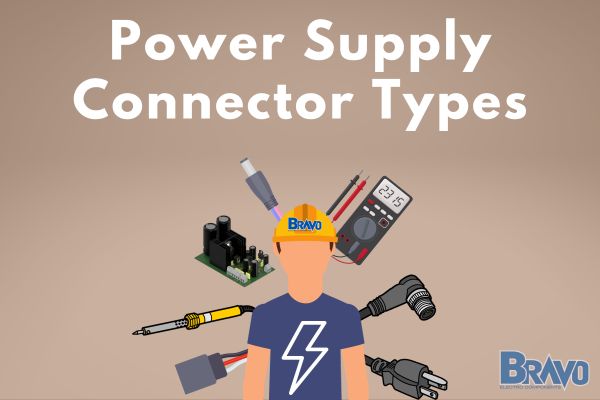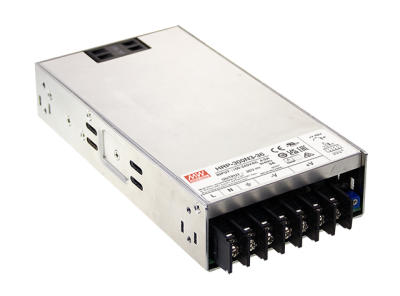
Whether you’re trying to keep medical equipment functioning or you’re optimizing your industrial facility, power supplies are the heart that keeps your operation alive.
But while you may be familiar with the different types of power supply or the common types of LED drivers, did you know there are different power supply connector types?
From terminal blocks to Molex connections and more, we’re going to break down the most common types of power supply connectors while empowering you to choose the right one for your unique needs.
This will help you feel confident going out and sourcing the right unit - whether you’re replacing a PSU or building a system from scratch. But, if you want to cut through all the noise and just get help picking the right power supply connector, don’t hesitate to reach out.
Here at Bravo Electro, we have a world-class customer support staff ready to guide you through the process and pick the right equipment. And, the most trusted power supply manufacturers and models are just a click away in our online catalog!
The Role of a Power Supply Connector
As the name suggests, a power supply connector is the proverbial handshake between a device and its power source. It's a bridge, a communicator, and a gatekeeper.
Let's delve into its crucial functionalities and the pivotal role it plays in system integration before getting into the types of power supply connectors. It ensures:
- Stable Power Delivery: A well-designed connector guarantees consistent power flow, ensuring devices operate without hiccups or interruptions.
- Flexibility in Connections: With evolving tech landscapes, a diverse range of equipment needs to sync up. Connectors cater to this, offering the ability to link varied devices across platforms seamlessly.
- Protection Against Surges: Beyond just connectivity, these connectors act as the first line of defense against power surges, protecting sensitive equipment from potential damage.
- Seamless Communication: In multi-device setups, especially in industrial scenarios, the connector ensures that every component 'talks' to the other. A minor misstep here can lead to a cascade of operational failures. The right connector ensures that the conversation is smooth.
- Scalability: As businesses grow, so do their operational needs. Power supply connectors play an indispensable role in ensuring systems can be expanded without the need for extensive overhauls.
- Reliability: Even a momentary lapse in power can have grave consequences in critical applications - think medical equipment or intricate manufacturing processes. The connector's role here is paramount, ensuring not just power, but trust.
That being said, those without an understanding of the various power supply connector types can find themselves perplexed in setting up electrical systems. So, let’s help you decipher the differences among the different types of power supply connectors and choose the right one for your operation.
What are the Different Power Supply Connector Types?
Navigating the labyrinth of power supply connectors can be daunting, but having a clear understanding of the various types can be the difference between optimal system performance and unforeseen downtimes.
These connectors may vary in design and application, but they share a common objective: to ensure a seamless and reliable transfer of power. So, what are the different types of power supply connectors?
DIN Connectors
The abbreviation 'DIN' stands for Deutsches Institut für Normung, the German national standards organization that originally introduced this type of connector. They have since become synonymous with reliability:
- Design Overview: These are typically round and feature a protective metal skirt. They can have varying pin numbers and arrangements.
- Application: While DIN connectors are prevalent in audio, video, and data applications, DIN rail power supplies are a different category altogether, usually used for mounting circuit breakers and industrial control equipment inside equipment racks..
- Key Advantage: Their shielded design minimizes interference, ensuring that the transmission of power remains consistent and untainted.
We have an array of DIN rail power supply units here at Bravo Electro if you believe this is the style you need. Otherwise, let’s move on to the next in our list of power supply connector types…
Molex Connectors
The term 'Molex' has almost become generically used to describe any pin and socket interconnection. However, the true Molex connector is characterized by a shielded design:
- Design Overview: The distinct pin and socket system encapsulated in a plastic housing ensures that contacts remain shielded, preventing short circuits and unwanted disconnections.
- Application: While they find uses in various fields, they're especially favored in applications requiring multiple circuit transmissions due to their ability to handle different circuit sizes.
- Key Advantage: Their versatility is their standout feature. Molex connectors are made to fit different wire gauges and circuit sizes, ensuring they can be tailored to specific needs.
Most of our open frame power supplies 200 watts and under use this type of connector.
Terminal Blocks
These are a front-runner when it comes to DIN Rail power supplies and high-power industrial equipment. You’ll find them on high voltage power supplies. And, terminal blocks exemplify a very high power supply efficiency rating.
- Design Overview: These connectors involve a clamping component and a conducting strip. They're designed for easy wire attachment without needing to plug or unplug.
- Application: Given their robust nature, they're the top choice for DIN Rail power supplies and other heavy-duty industrial power supplies.
- Key Advantage: Simplicity meets efficacy. Terminal blocks facilitate easy wire management, provide reliable connections, and support high current ratings.
We have a guide specifically on how to use a terminal block connector in our blog if you’re interested in learning more. Otherwise, let’s progress to the next style on our list of the different types of power supply connectors.
Most of the enclosed power supplies we have use this type of connector.
Barrel Connectors
These may seem simplistic at first glance, but beneath their unassuming exterior lies a design tailored for convenience and versatility.
- Design Overview: As the name suggests, barrel connectors feature a cylindrical shape, comprising an outer sleeve and an inner pin. This design allows for quick and secure connections, especially in devices that require frequent plugging and unplugging.
- Application: Their commonality can be seen in low-voltage applications such as powering small household electronics, charging devices, and audio equipment. Their polarized nature ensures correct power alignment, safeguarding devices from potential damage.
- Key Advantage: The beauty of barrel connectors is in their universality and ease of use. They are often interchangeable, and their simple design minimizes connection errors, making them a popular choice for general-purpose power supply needs.
Most of our external adapter power supplies under 6 amps use the barrel type of connector.
XLR Connectors
These are distinguished by their robust design and precise locking mechanism. XLR connectors are the go-to for professionals seeking reliability in audio transmission.
- Design Overview: XLR connectors typically come with three pins, although variations with more pins are available. Their circular design is complemented by a latch mechanism, ensuring secure connections even in environments with frequent movement.
- Application: These are predominantly found in professional audio, video, and stage lighting equipment, battery chargers. This is because their design ensures interference-free signal transmission, crucial for clear audio and visual output.
- Key Advantage: Beyond their robust construction, the XLR's balanced audio transmission capability ensures minimal interference, making them indispensable in settings where audio clarity and reliability are non-negotiable.
Example of products that use the XLR connector: NPB-120-12XLR, NPB-240-24XLR, NPB-360-48XLR
Blind Mate Connectors
Last but not least on our list of the different types of power supply connectors is the blind mate connector. These are paired with rack mountain systems to ensure seamless connections without the need for direct line-of-sight alignment.
- Design Overview: These connectors are crafted with self-aligning features, allowing for connections to be made in tight spaces where visual confirmation might be challenging.
- Application: Blind mate connectors are typically found in data centers, telecommunications equipment, and other rack-mounted systems. They provide reliable power and data connections between modules in high-density racks.
- Key Advantage: The ability to 'blindly' connect makes maintenance, upgrades, and system expansion considerably faster and more efficient. Their design ensures that even in spaces crowded with equipment, connections remain steadfast and secure.
Our rack mount power supply collection is worth exploring if you are interested in learning more about this style. But, let’s find out exactly which of the power supply connector types best suits your needs below.
Choosing the Right Type of Power Supply Connector
So, what power supply do I need? Making an informed choice isn’t just about picking a connector - it's about ensuring system efficiency, longevity, and most importantly, safety. Let’s delve deeper into the key considerations.
Understand Your Needs
It's essential to have a crystal-clear understanding of the requirements before choosing a power supply connector. Here are the things you need to take into consideration:
- Power Requirements: The energy demands of your equipment will guide your connector choice. Will the connector be used for low-voltage applications or high-power operations? Learn more about PSU voltage and what happens if your PSU is too weak in our blog.
- Operational Environment: A connector's environment can be its best friend or worst enemy. Will it be in a static setup or a mobile one? Will it face harsh conditions or a controlled environment? This will influence the degree of protection your unit needs. Again, you can learn more in our blog where you’ll find tips on power supply certifications, power supply specs, PSU ratings, and more.
- Frequency of Use: How often will the connection be made or broken? Some connectors are designed for frequent plugging and unplugging, while others are more suited for long-term static applications.
Compatibility
It might seem basic, but ensuring connector compatibility is paramount. It’s not just about physical fit, though. Electrical, thermal, and mechanical compatibilities are just as critical.
The connector must be congruent with the devices it's intended to serve. For instance, using a barrel connector meant for a 12V device on a 9V gadget can lead to performance issues or even damage.
Similarly, you should think about how the connector integrates with the larger system. Does it streamline operations, or does it complicate them?
Longevity and Durability
The best connectors are those that can stand the test of time given the rigors of their environment. This is where material selection comes into the equation, influencing the power supply lifespan. Corrosion-resistant materials and gold-plated contacts, for example, can significantly enhance a connector's longevity.
Consider how the connector will fare after hundreds or thousands of connection cycles. A connector might seem robust initially but could wear down over repeated use if you skimp on quality.
Safety Precautions
Safety is a paramount concern that should never be compromised regardless of the use case, but especially in medical or industrial scenarios. Ensure the connector supports correct polarity and grounding, preventing potential short circuits or electrical hazards.
You should think about insulation and shielding as well. Proper insulation can prevent accidental contact or electrical leakage. Meanwhile, shielding can prevent interference, ensuring the connector - and by extension, the device - operates optimally without external disruptions.
Not Sure Which is Right For You? Find it With Ease at Bravo Electro!
The best way to ensure you get the right power supply connector types for your unique needs is to simply reach out to the experts here at Bravo Electro. We are your trusted source for all things power supply - not just resources, but the actual PSUs themselves too!
Our customer service team is equipped to discuss your needs and help you find the right unit - whether it’s a modular power supply or open frame power supply. We also have enclosed power supplies, external power supplies, medical grade power supplies, and more.
But, it’s not just about the diversity of styles we carry - it’s the peace of mind you’ll enjoy knowing you’re getting the best quality possible. We source our equipment from the most trusted brands in the industry like Mean Well.
So, what are you waiting for? Find the perfect PSU for your unique needs today!
Final Thoughts on the Different Power Supply Connector Types
We hope this conversation on the different types of power supply connectors eliminates all the stress and uncertainty you came here with and leaves you feeling confident as to which type is right for you.
Each connector has a unique design and purpose, holding the potential to either elevate your system's performance or become its Achilles heel. It's not just about power transfer - it's about ensuring flawless communication between devices, safeguarding equipment, and fortifying the very foundation of your operations.
You can learn more about the world of power supply in our blog. We have articles on how to tell if power supply is failing, the difference between AC and DC, linear vs switching power supply, regulated vs unregulated power supply, what is an AC adapter how to convert DC to AC, repairing power supplies, how to install power supply, trouble shooting power supplies, power supply topologies, and more.
Otherwise, it’s time to find the perfect power supply connector types at Bravo Electro. We have what you need whether it’s a 12 volt power supply, 24 volt power supply, 48 volt power supply, or even a more robust custom unit.
After all, the best way to enjoy peace of mind knowing you’re getting the right equipment for your operation is to leverage our experience and let us guide you through the process! Explore our range at Bravo Electro today and empower your systems with unmatched reliability.









